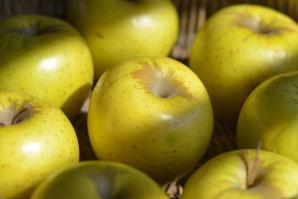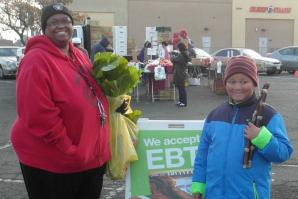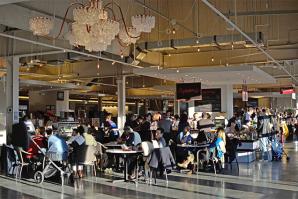Your next visit to the public library might not be to check out a book. Libraries are becoming critical agents in a sprouting local food movement, so you might instead bite into an actual meal, join a cooking class or even check out garden seeds.
“Libraries want to have an active role in helping people improve their lives, not just sliding a book across a desk,” explains Lori Easterwood, programming and partnerships coordinator at the Sacramento Public Library. She says libraries have been misunderstood as quiet spaces where people come to read.
In fact, libraries have long been places where the public come to actively improve their lives through computer training, GED courses, homework coaching for elementary students and more. Most libraries are also equipped with community learning spaces, and some even have kitchens. Why not cultivate library programming that feeds the mind and the belly?
Summer Meal Programs
Some libraries are doing just that. In addition to cooking classes, seed swaps and food literacy programming, libraries are now providing summer meal programs to low-income schoolchildren.
“When you hear about a library in a food desert, it seems such a natural match,” Easterwood says. “That’s one of the ways libraries can support feeding the community. We have this great infrastructure available during summer when schools are out.”
Libraries buzz with children all season long, especially as they become a school’s replacement for summertime learning through popular reading programs. In Sacramento, 58%, of kids participate in free and reduced school lunch programs — meals they often go without when school’s not in session. Librarians saw a way to bridge the gap by working with school districts to bring the meals onsite. School districts supply the meals, and library volunteers pass them out.
“While they’re there, we sign them up for summer reading to continue their education,” explains Easterwood.
Last summer in Sacramento, the Valley Hi-North Laguna and Southgate libraries served 4,000 meals. They plan to repeat the programs this coming summer.
In California, State Librarian Greg Lucas says 60 libraries participated in the program last summer, and this year they hope to increase the number to 100 libraries.
“The sad thing is, for a lot of kids, that’s their best meal of the day,” Lucas says.
Seed Libraries
In addition to summer meals, libraries are stirring up a healthy mix of food-related resources. The Sacramento Public Library system, comprised of 28 local branches, houses learning gardens, garden-tool lending, cooking classes for children, seed swaps and a bushel of tasty programs free to the public.
“Any nontraditional library item is seen as strange,” Easterwood says. “But it’s not terribly different from a book. Books have the potential to change someone’s life, and so can a seed.”
Inspired by the popularity of home gardening, seed libraries have sprouted up around the country. Libraries provide seeds that the public can “check out.” Folks plant the seeds with the idea that they will then re-harvest them from their crop and return them to the library, where they can be lent out to someone else.
“The real secret is,” Easterwood whispers, “they’re mostly seed giveaways.” She laughs. Easterwood goes on to say that since the seeds are fairly inexpensive, the library doesn’t mind providing this service for free to its patrons.
In some instances, these seed libraries have been met with controversy. In Pennsylvania, the state’s department of agriculture came after one library, claiming its seed lending was illegal and could open the public to agro terrorism.
In Los Angeles, libraries test seeds before lending them out to prevent the spread of fungus or invasive plants.
In Sacramento, life on the seed lending front is peaceful. According to Easterwood, they’ve had no complaints with their program. In fact, patrons at the Rio Linda branch enthusiastically begged the library to launch a seed program — which it did. Three Sacramento libraries now run seed swaps in addition to their seed libraries. The swaps are a kind of seed party. Gardeners bring in seeds they’ve collected and exchange them with fellow hobbyists. The library’s only role is to play host.
As libraries become more active in the food movement, you may want to renew your library card. It might be the next piece of plastic that helps you put a meal on the table.
Recommended For You

It’s Hip to Be a Foodie
What dressing for success means in the food movement
To find the kind of innovative employees needed to continue pushing the food movement forward, it’s important to look as much as listen. For instance:
“This position requires a vegetable costume as occasional work attire.”

The Great Big Local Food Movement
As more consumers demand local fare, large food services and producers shift focus
Can large institutions, like college campuses, get involved with farm-to-fork? Can they leverage their buying power and still provide a local food experience on a large scale? Customer influence is making an impact on big buyers, inspiring sizable companies and organizations to launch full-tomato into buying local.

Healthy Options
Farmers markets and urban growers combat local food deserts
Despite living near some of the most productive farmland on earth, many Sacramentans are unable to find produce that’s both fresh and affordable in their own neighborhoods.

Sacramento Needs a Public Market
The Farm-to-Fork Capital is incomplete without one
Great food capitals of the world: Can you name them? Florence. Paris. Tokyo. Barcelona. Istanbul. Singapore. What do these destinations of culinary delights offer?



